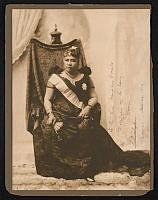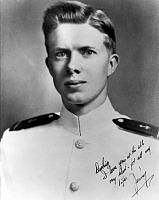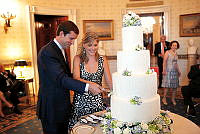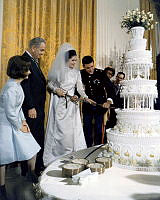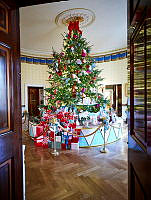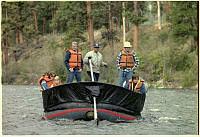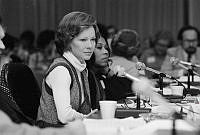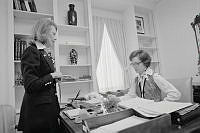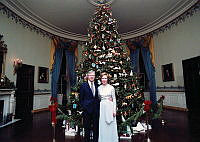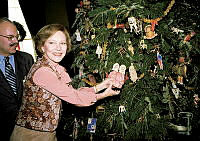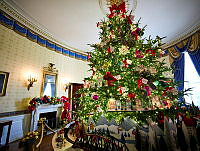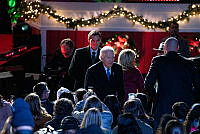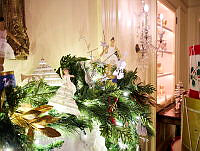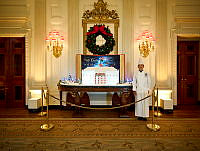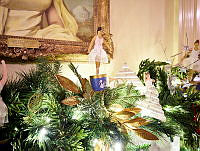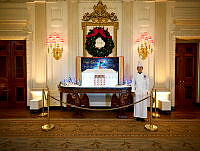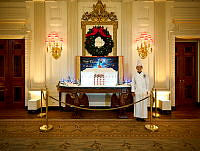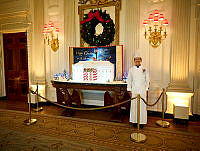Rubenstein Center Scholarship
A Widower's Hostess
Angelica Van Buren in the White House
When President Martin Van Buren assumed office on March 4th, 1837, there was no woman to assume the role of first lady. His wife, Hannah Van Buren, had contracted an illness and died in February 1819, years before he took office.1 President Van Buren hired staff to serve in the absence of a White House hostess. Census records from 1840 list the numerous enslaved and free workers of the White House during the Van Buren administration.
President Van Buren occupied the White House with his small staff and four unmarried sons: Abraham, John, Smith, and Martin.3 Former First Lady Dolley Madison, famous in Washington social circles for entertaining, introduced her young cousin Angelica Singleton to President Van Buren and his eldest son Abraham.4
Sarah Angelica Singleton was born in February, 1818 in South Carolina. She was raised in an affluent family and lived on a plantation in South Carolina.5 Angelica attended schools in both South Carolina and Philadelphia. She partook in a White House dinner shortly after President Van Buren’s inauguration with her cousin Dolley. Soon after, President Van Buren’s son, Abraham, began to court Angelica.

This oil on canvas painting of Angelica Singleton Van Buren was completed by Henry Inman in 1842.
White House Collection/White House Historical AssociationDuring his father's administration Abraham Van Buren served as his private secretary in the White House. Abraham and Angelica were married on November 27, 1838. Afterwards Angelica moved into the White House with the Van Buren family, resulting in the White House finally having an in-residence hostess for President Van Buren.
Angelica Van Buren fulfilled her first duties as acting first lady when she hosted the 1839 White House New Year’s Day Reception.6 She quickly became the talk of the town as Washington’s new leading lady for social events. She also established a working partnership between the White House and the press.7
Angelica also became the first sitting hostess of the White House to travel to Europe.8 Angelica and Abraham embarked on a trip abroad to Great Britain and France. Both American and European newspapers documented the young Van Burens’ travels overseas. After the Panic of 1837, the financial stability of the United States was doubted by many European countries. Angelica and Abraham were tasked with assuring Great Britain of the United States’ financial standing.9 In France, the Van Burens were greeted by French King Louis Philippe and were treated like royalty.10

This oil on canvas painting of President Martin Van Buren was completed by George P. A. Healy in 1858. Van Buren served as the eighth president of the United States from March 4, 1837 to March 4, 1841.
White House Collection/White House Historical AssociationAngelica enjoyed her queenly treatment abroad and decided to bring some European entertaining traditions back to the White House. After discussing these traditions with her cousin Dolley, Angelica began implementing new practices during White House events.11 Angelica’s most notable change to White House entertaining was her new preferences for receiving guests. William Allman, White House Curator, reflected on the hosting changes promoted by Angelica: “[she] stood on a dais to receive the public, surrounded by her women friends all dressed in white, suggesting a charming custom of Queen Victoria. It was the wrong house for that.”12 Angelica’s new entertaining practices were not well-received by the American public.
Angelica’s new-found influence over White House entertaining affected how the public viewed the Van Buren administration. Whig Congressman Charles Ogle of Pennsylvania lambasted the regal reputation of the Van Buren White House in his three-day “Gold Spoon Oration.” Ogle criticized President Van Buren’s alleged misuse of the funds appropriated to redecorate the White House.

This sugar spoon was created in the 1840s and used during the Van Buren administration. Lavish expenditures for White House furnishings, such as this spoon, came under scrutiny during Van Buren’s presidency when Congressman Charles Ogle delivered his famous “Gold Spoon Oration.”
White House Collection/White House Historical AssociationWhile Van Buren had used both the allotted Congressional funds and even some of his own money to refurnish the mansion, Ogle’s published oration reinforced public perceptions that the president was a New York elitist who cared little for the common man. Ogle and others urged citizens to support Whig presidential candidate William Henry Harrison, “a simple frontier Indian fighter, living in a log cabin and drinking cider, in sharp contrast to an aristocratic champagne sipping Van Buren.”13 While the Panic of 1837 played a prominent role in President Van Buren’s electoral defeat in 1840, the allegations of impropriety and extravagance, coupled with the lavish White House lifestyle espoused by Angelica, only fueled the fires of Van Buren’s opposition.
Post-presidency, Angelica continued entertaining for her father-in-law Martin Van Buren at his home, “Lindenwald,” in New York. After the passing of Angelica and Abraham’s first child in the White House, the couple had four sons in New York. Angelica balanced both familial ties in South Carolina and their plantation-based fortunes with her father-in-law’s supporters who were engaged in anti-slavery campaigns.14 In the years following, Angelica moved to New York City with Abraham and became involved with charity work and assisting working class citizens in the Industrial Age. She passed away in December, 1877 at the age of 59 in New York City.





